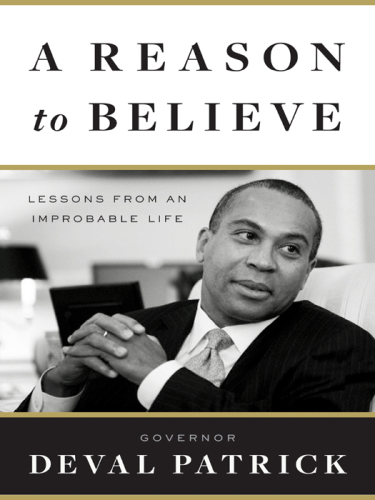
A Reason to Believe
Lessons from an Improbable Life
کتاب های مرتبط
- اطلاعات
- نقد و بررسی
- دیدگاه کاربران
نقد و بررسی

February 1, 2011
Massachusetts' first black governor debuts with a candid memoir that emphasizes how caring mentors, teachers and other adults helped shape his life and values.
Now in his second term, Patrick grew up poor on Chicago's South Side in the 1950s and '60s, attended Harvard and Harvard Law, and worked as a civil-rights advocate and corporate executive before entering politics. His father, a jazz musician and black militant, deserted the family when the author was four. Patrick, his mother and his sister moved in with his grandparents, who got by on his grandfather's wages as a bank janitor and tried to shield their grandson from racism. His grandmother always said they weren't poor—they were "broke," which allowed for the possibility of a better life, he writes. It was an early lesson in how he could shape his own destiny. A bright, ambitious loner, he learned other lessons in possibility from kind teachers, first in gang-ridden Chicago public schools and then as a scholarship student at Milton Academy in Massachusetts, where he was "saved by the love of adults." His prep-school mentors—an Old Yankee English teacher and an upper-middle-class African-American woman whose children also attended Milton—treated Patrick with affection as he struggled to bridge the worlds of poverty and privilege. Like the selfless church ladies of his childhood, they taught him "to love openly, generously, and conspicuously." In recounting his life in politics, the author explains how the qualities he admires in others, such as compassion and generosity of spirit, have sustained him amid personal attacks. By his own admission sometimes ill-tempered as a politician, Patrick gives powerful voice to the reflective inner man who has a keen eye for things that really matter. A portion of the proceeds from the book will go to the charity A Better Chance.
A welcome celebration of idealism in a cynical time.
(COPYRIGHT (2011) KIRKUS REVIEWS/NIELSEN BUSINESS MEDIA, INC. ALL RIGHTS RESERVED.)

March 1, 2011
The second-term governor of Massachusetts offers a memoir distinctive for a politician's because Patrick keeps the focus on the personal, with the subtitle's lessons specified as the eight chapter titles (e.g., "Know Who You Are"). They are presented as lessons that Patrick himself learned: the chapters read as straight memoir, rather than didactic pronouncements. Patrick shows himself here to be a gifted writer. Especially engrossing are the early pages on his childhood--he summons forth all the senses as he describes 1950s-60s South Side Chicago. His father, later a notable sax player, left when Patrick was three. After eighth grade, through a teacher's guidance, Patrick was accepted on full scholarship at an elite New England boarding school, "a different planet." Even as he achieved success in the worlds of Harvard, legal practice, work as a corporate general counsel seeking to end company racial discrimination, and as the nation's first two-term black governor, Patrick presents his triumphs here as victories over his own weaknesses. His writings about his wife, Diane, are particularly touching. VERDICT Recommended to readers of memoir and to all keeping an eye on our country's past and future.--Margaret Heilbrun, Library Journal
Copyright 2011 Library Journal, LLC Used with permission.

April 1, 2011
Patrick grew up in a Chicago tenement that his family shared with his grandparents. There were never enough resources and food to go around. His father had abandoned his mother and their two children to pursue a career as a jazz musician in New York. Bright and decidedly out of place in the rough and tumble of public school, Patrick accepted an offer to attend boarding school in New England and began a struggle to reconcile the worlds of his home and his schooling. He went on to Harvard, relief work in Africa, the NAACP and the Justice Department, and executive berths with Texaco and Coca-Cola. Eventually, he was elected the first black governor of Massachusetts. While retracing the way, Patrick pays specific and warm tribute to those who helped him, from Chicago public school teachers and elite boarding school masters to families and individuals who gave him shelter, support, and assistance in Africa to an assortment of family, friends, and strangers who encouraged and assisted him, fortifying his sense of social justice, faith, and idealism.(Reprinted with permission of Booklist, copyright 2011, American Library Association.)

























دیدگاه کاربران